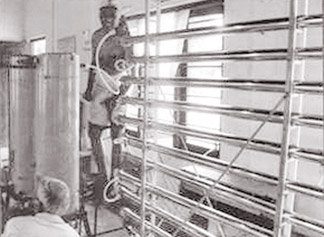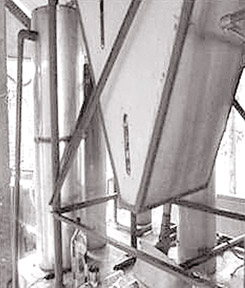Asokamalagama will smile bright again...
 Not
many among you may know Wijesundera Mudiyanselage Jayawardena (Wimoo) or
his friend and partner in affairs to do with water, Jayalth
Palihawadanage Padmasiri. I first got to know Wimoo, through my departed
friend, the evergreen late Architect Geekiyanage ‘Turner’ Arthur
Wickramasinghe, for they worked together at the State Engineering
Corporation in the early 70’s. Wimoo, a civil engineer, after a stint
working in Nigeria, returned to Sri Lanka and co-founded the company
Link Engineering. Not
many among you may know Wijesundera Mudiyanselage Jayawardena (Wimoo) or
his friend and partner in affairs to do with water, Jayalth
Palihawadanage Padmasiri. I first got to know Wimoo, through my departed
friend, the evergreen late Architect Geekiyanage ‘Turner’ Arthur
Wickramasinghe, for they worked together at the State Engineering
Corporation in the early 70’s. Wimoo, a civil engineer, after a stint
working in Nigeria, returned to Sri Lanka and co-founded the company
Link Engineering.
|

The Electro-coagulation Unit |
Associated with the renowned architect late Geoffrey Bawa in building
the then ‘controversial’ hotel project on the slopes of the bank of the
Kandalama Wewa, ‘Link’ made a name for itself for being most ethical and
reliable in the execution of its obligations and commitments.
Unassuming man
Upon bagging several construction excellence awards, Wimoo’s other
‘baby by design’, Link Natural was born. Creations such as ‘Samahan’,
the various Link branded Arishtas (herbal tonics) and the herbal
toothpaste ‘Sudantha’ were the early wins for the company. Moving on to
Plenty Foods which created natural Soya products and ‘Samaposha’, these
were moulded to be much sought after products with being socially
responsible as its core value. He was also on to the manufacture of
activated carbon in a joint venture with the Chinese and now ventures to
call himself a ‘retired’ civil engineer at the ripe age of 71. A most
humble and unassuming man, if one met him on the street, would pass him
by without a second thought that, here is a man of such achievement.
Water quality
|

Modified unit using plate electrodes |
It was indeed a surprise, when I received a call from Wimoo about
three weeks ago to let me know that he was coming over to our area for
some work on a water purification project. He and former senior chemist
of the Water Supply and Drainage Board Padmasiri were assisting the
water supply authorities in the Ambalantota area to set up and test a
pilot water purification plant. He wanted to come visit, in-between his
work and was to brief me on an ‘interesting’ assignment they had
taken-on in the area of water quality enhancement.
It got me excited and I was naturally interested. The village where I
live is called Kiula and it has got its name because its ground-water is
brackish. Unsuitable for drinking or for regular usage without adequate
treatment, this was a major problem villagers here had to face for a
long time. This was prior to the introduction of treated pipe-borne
water, and as an experiment, we at our home had begun to use a method of
producing drinking water from the ‘air’. It is a process of condensation
of the humidity in the air, turning it into clean drinking water. Yet,
like Wimoo and Padmasiri would tell me, the ‘air’ water we drink, is not
of adequate ‘heaviness’ without any minerals in it and we would need to
have supplements of those taken orally to ensure that we stay healthy.
Lame and the blind
Wimoo and Padmasiri arrived one morning as planned, equipped with
testing equipment and a set of educational leaflets on a new line of
work they had undertaken. This water-quality-enhancement duo compare
their engineer/chemist union to that of a ‘Kora saha Andaya’ (the lame
and the blind) relationship, much like the twosome in the old folklore,
where one could not function without the other. While the chemist
identified the problem, the engineer would design practical solutions
and necessary equipment to overcome them.
One such endeavour was what they described to me as their project to
‘Make a village smile’. During a survey conducted in Sri Lanka’s
dry-zone, Padmasiri identified the remote village of Asokamalagama in
Pemeduwa, in the Anuradhpura District as one, where the quality of the
water they drank was suspected to be the cause for them to have kidney
diseases such as chronic renal failure of unknown etiology and dental
fluorosis, commonly known as yellow or bad teeth. Wimoo, having read
reports on this problem in the media, made contact with Padmasiri, whom
he did not know before, with a resolve to assist him seek a solution.
Overdose of fluoride
 |
 |
|
Cases of Dental
Fluorosis in Asokamalagama |
A survey of the 37 wells of this village with a population of about
1,500 people revealed that 34 of the wells had a fluoride level of more
than 3.0 mg per litre (l), while the safe levels of fluoride stands at
less than 1.0 mg/l. It was found that 56.8 percent of the wells had a
conductivity of more than 1,000 micro-semen per centimetre (cm) showing
high dissolved mineral content in the water. Only four wells available
in the village, met the required water quality standard with a fluoride
content of less than 1.0 mg/l.
According to them, the earlier community-based water supply scheme
had been distributing water to the village with a fluoride content of
5.5 mg/l since 2005. As a result of the total hardness content of 180
mg/l, measured through Calcium Carbonate (CaCo3) being low, the taste of
the water remained normal, thus encouraging the villagers to drink it
without suspicion or concern. Yet, the risks faced by them of having
dental/skeletal fluorosis, was very high with such a high a fluoride
concentration of 5.5 mg/l in the drinking water.
In April 2010, the duo undertook the challenge of solving this
problem for the people of Asokamalagama. Electro Coagulation technology
was deemed to be the best option and a bench scale model was tried in a
five litre capacity vessel by dipping four Aluminum electrodes in it.
The preliminary trials conducted in the laboratory showed a reduction of
fluoride by 80 - 90 percent and the hardness by 40 - 50 percent. This
success led to their designing an electro coagulation unit with 10 tube
reactors and a pilot plant was fabricated to process 100 litres of
water/per hour capable of operating for 10 hours a day. With a further
modification of its efficiency by using plate electrodes instead of tube
electrodes, in December that year, they were able to increase processing
capacity to 500 litres /per hour. Cost of fabrication, they said was
minimal for all the mechanical and electrical units used were those
already available in Sri Lanka.
Self-reliant
According to Wimoo and Padmasiri “women in the village were trained
in operation and cleaning the pilot plant thus empowering the village
women. While the plant was a gift to the villagers, the processed water
from the EC unit is sold at Rs. 2.00 per litre by the Community Based
Organization (CBO).
“Money collected is used to pay the women operators and for the
plant’s maintenance, ensuring its sustainability.
Already this unit is in operation for over ten months, meeting the
average demand of 5,000 litres of processed drinking water per month, of
the village of Asokamalagama”. Some of the villagers living around the
four better quality wells are still able to use the water from them for
drinking. The processed water was also subjected to regular water
quality tests such as pH, Conductivity, Total Hardness, Total
Alkalinity, Fluoride and residual Aluminum. The values obtained
conformed to the SLS 614: 1983 of drinking water standards in Sri Lanka
and is today serving to make the next generation of the villagers be
able to smile bright again without any inhabitance and be safe from
diseases affecting the kidney, preventing them from drinking water with
high concentrations of fluoride.
The message Wimoo has for all of us, is not to be taken-in by the
frills of the fancy consumer goods that adorn living rooms of our homes,
but to make an effort to focus more on the basics of living such as the
quality of the drinking water, the nutritional quality of the food we
eat to ensure that the children as well as adults of this nation will
stay healthy and strong, to face the challenges of the future.
[email protected] |



